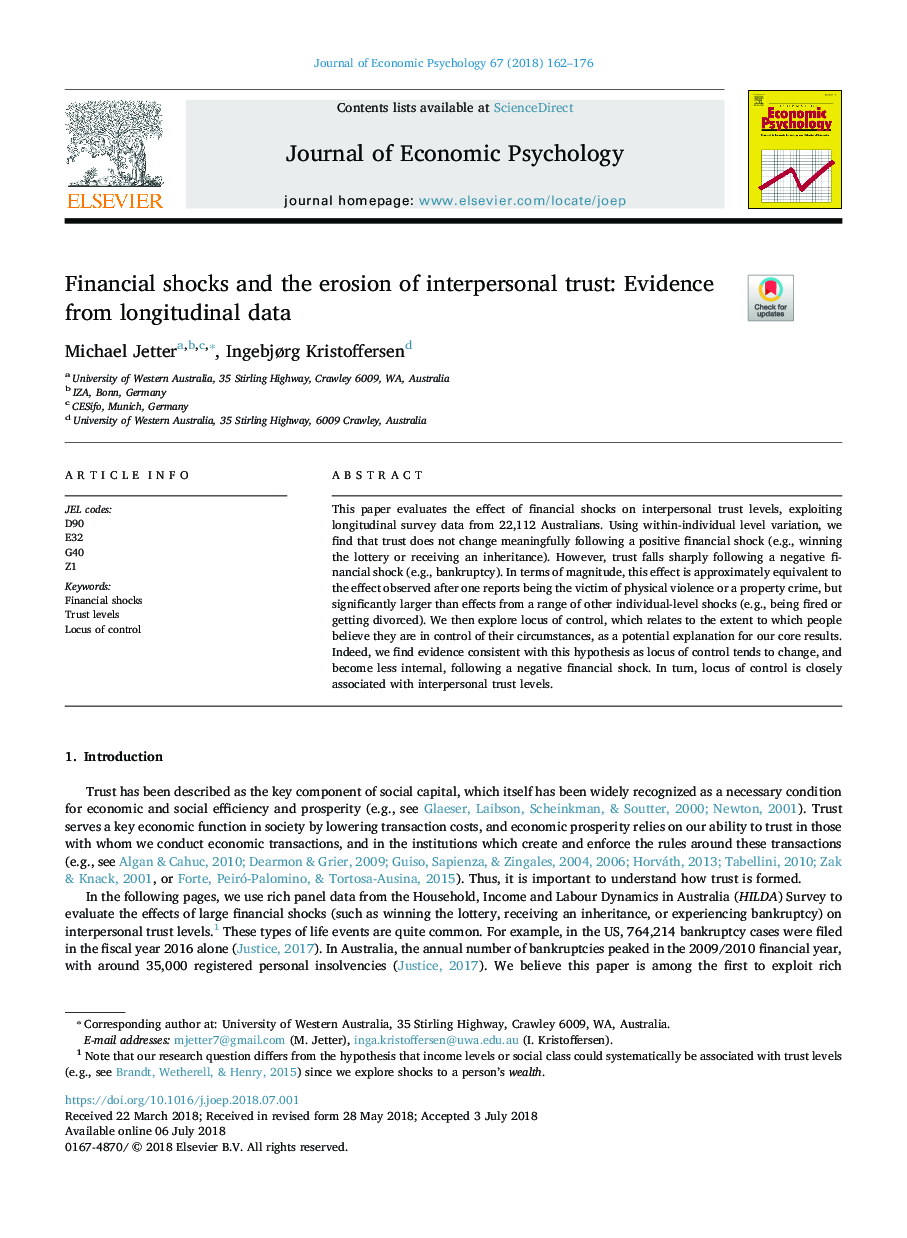| کد مقاله | کد نشریه | سال انتشار | مقاله انگلیسی | نسخه تمام متن |
|---|---|---|---|---|
| 7243961 | 1471699 | 2018 | 15 صفحه PDF | دانلود رایگان |
عنوان انگلیسی مقاله ISI
Financial shocks and the erosion of interpersonal trust: Evidence from longitudinal data
ترجمه فارسی عنوان
شوکهای مالی و فرسایش اعتماد بین فردی: شواهد از داده های طولی
دانلود مقاله + سفارش ترجمه
دانلود مقاله ISI انگلیسی
رایگان برای ایرانیان
ترجمه چکیده
در این مقاله تاثیر شوک های مالی بر سطح اعتماد میان فردی، با بهره گیری از داده های بررسی طولی از 22،112 استرالیا. با استفاده از تنوع درون فردی، متوجه می شویم که اعتماد به طور معناداری پس از شوک مثبت مالی (مثلا پیروزی در قرعه کشی و یا دریافت ارث) تغییر نمی کند. با این وجود، اعتماد به شدت پس از یک شوک مالی منفی (به عنوان مثال، ورشکستگی) کاهش می یابد. از نظر اندازه، این اثر تقریبا برابر با تأثیری است که پس از یک گزارش از قربانی خشونت فیزیکی یا جرم و جنایت، دیده می شود، اما به طور قابل توجهی بزرگتر از اثرات طیف وسیعی از شوک های فردی دیگر (مانند اخراج یا جدا شدن از طلاق) ) پس از آن ما کشف مکان کنترل، که مربوط به میزان اعتقاد مردم به کنترل شرایط آنها است، به عنوان یک توضیح بالقوه برای نتایج اصلی ما است. در واقع ما شواهدی را با این فرضیه مطابقت می دهیم به این دلیل که کنترل کننده موضع تغییر می دهد و به دنبال شوک مالی منفی کمتر داخلی می شود. به نوبه خود، منبع کنترل با سطوح اعتماد بین فردی ارتباط دارد.
موضوعات مرتبط
علوم انسانی و اجتماعی
مدیریت، کسب و کار و حسابداری
بازاریابی و مدیریت بازار
چکیده انگلیسی
This paper evaluates the effect of financial shocks on interpersonal trust levels, exploiting longitudinal survey data from 22,112 Australians. Using within-individual level variation, we find that trust does not change meaningfully following a positive financial shock (e.g., winning the lottery or receiving an inheritance). However, trust falls sharply following a negative financial shock (e.g., bankruptcy). In terms of magnitude, this effect is approximately equivalent to the effect observed after one reports being the victim of physical violence or a property crime, but significantly larger than effects from a range of other individual-level shocks (e.g., being fired or getting divorced). We then explore locus of control, which relates to the extent to which people believe they are in control of their circumstances, as a potential explanation for our core results. Indeed, we find evidence consistent with this hypothesis as locus of control tends to change, and become less internal, following a negative financial shock. In turn, locus of control is closely associated with interpersonal trust levels.
ناشر
Database: Elsevier - ScienceDirect (ساینس دایرکت)
Journal: Journal of Economic Psychology - Volume 67, August 2018, Pages 162-176
Journal: Journal of Economic Psychology - Volume 67, August 2018, Pages 162-176
نویسندگان
Michael Jetter, Ingebjørg Kristoffersen,
